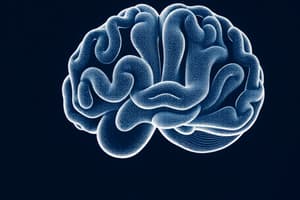Podcast
Questions and Answers
What is a key component of emotional intelligence that involves managing your emotions in a constructive manner?
What is a key component of emotional intelligence that involves managing your emotions in a constructive manner?
- Motivation
- Understanding others' emotions
- Empathy
- Self-awareness (correct)
Why is emotional intelligence important in life skills education?
Why is emotional intelligence important in life skills education?
- To improve mathematical skills
- To navigate personal relationships and future employment (correct)
- To enhance academic achievement only
- To develop physical strength
Which aspect of emotional intelligence involves developing inner motivation to achieve goals?
Which aspect of emotional intelligence involves developing inner motivation to achieve goals?
- Empathy
- Self-regulation
- Self-awareness
- Motivation (correct)
What does self-regulation in emotional intelligence refer to?
What does self-regulation in emotional intelligence refer to?
Which of the following is NOT a key component of emotional intelligence?
Which of the following is NOT a key component of emotional intelligence?
How does emotional intelligence contribute to building strong relationships?
How does emotional intelligence contribute to building strong relationships?
What is the definition of empathy?
What is the definition of empathy?
How does emotional intelligence contribute to reducing conflict?
How does emotional intelligence contribute to reducing conflict?
What is a benefit of teaching emotional intelligence alongside traditional life skills?
What is a benefit of teaching emotional intelligence alongside traditional life skills?
How does emotional intelligence help young people cope with stress and anxiety?
How does emotional intelligence help young people cope with stress and anxiety?
Which aspect of emotional intelligence focuses on utilizing nonverbal and verbal communication effectively?
Which aspect of emotional intelligence focuses on utilizing nonverbal and verbal communication effectively?
How does emotional intelligence contribute to developing strong leadership capabilities?
How does emotional intelligence contribute to developing strong leadership capabilities?
Study Notes
Emotional Intelligence: A Key Component of Life Skills Education
Overview
Emotional intelligence plays a significant role in our daily lives, influencing our interactions with others and our overall well-being. As part of life skills education, understanding and developing emotional intelligence is critical for young people to navigate the complexities of personal relationships, academic achievement, and future employment.
Importance of Emotional Intelligence
Emotional intelligence encompasses the ability to recognize and regulate one's own emotions, as well as to understand and respond appropriately to the emotions of others. This skill set is essential for building strong relationships, managing conflicts, and fostering a positive social environment. By promoting emotional intelligence, educators aim to equip students with the tools necessary to handle various situations effectively throughout their lives.
Development of Emotional Intelligence
Understanding and practicing emotional intelligence involves several key components:
- Self-awareness: Being aware of your own emotions, strengths, weaknesses, and values helps you to better understand your reactions and responses to different scenarios.
- Self-regulation: Managing your emotions in a constructive manner, such as staying calm under pressure or choosing not to react impulsively.
- Motivation: Developing inner motivation to achieve goals, drive change, and persist in the face of obstacles.
- Empathy: Understanding and responding to the needs and emotions of others, leading to stronger relationships and improved communication.
- Social skills: Utilizing nonverbal and verbal communication to build rapport, collaborate with others, and resolve conflicts effectively.
Benefits of Emotional Intelligence
By teaching emotional intelligence alongside traditional life skills, young people are better equipped to:
- Build resilient and supportive friendships.
- Reduce conflict and foster positivity in their surroundings.
- Enhance their academic and professional performance.
- Develop strong leadership capabilities.
- Cope with stress, anxiety, and other mental health challenges.
Conclusion
Emotional intelligence is an essential component of life skills education, providing young people with the necessary tools to navigate through personal relationships and manage everyday situations. By incorporating emotional intelligence into classroom instruction, educators can help students develop a greater understanding of themselves and others, leading to stronger social connections, improved communication, and overall well-being.
Studying That Suits You
Use AI to generate personalized quizzes and flashcards to suit your learning preferences.
Description
Explore the significance of emotional intelligence in life skills education and its impact on personal relationships, academic achievement, and future employment. Learn about the key components of emotional intelligence development and its benefits for young people's overall well-being.




